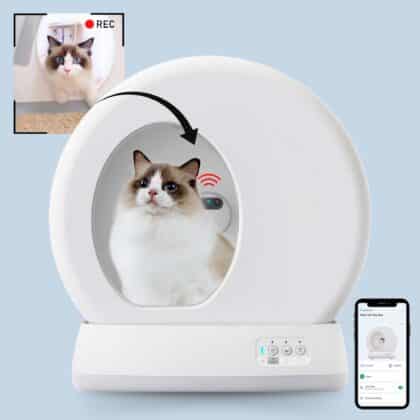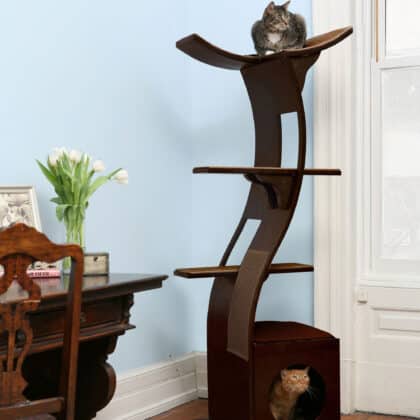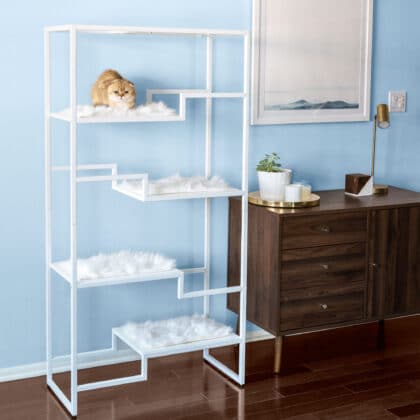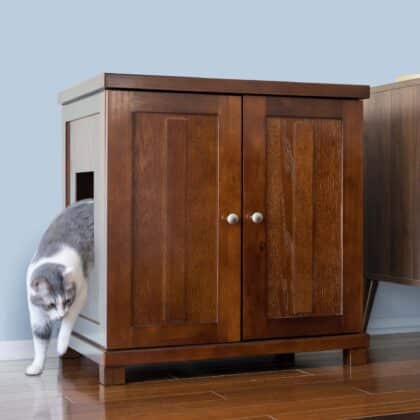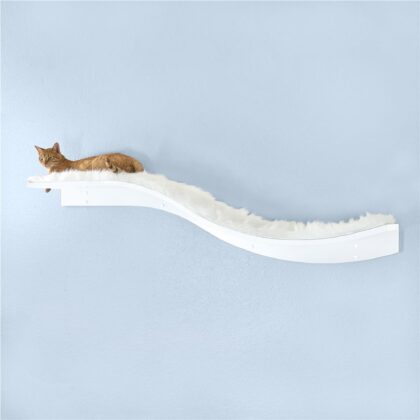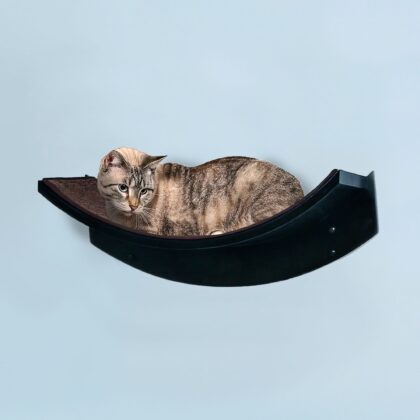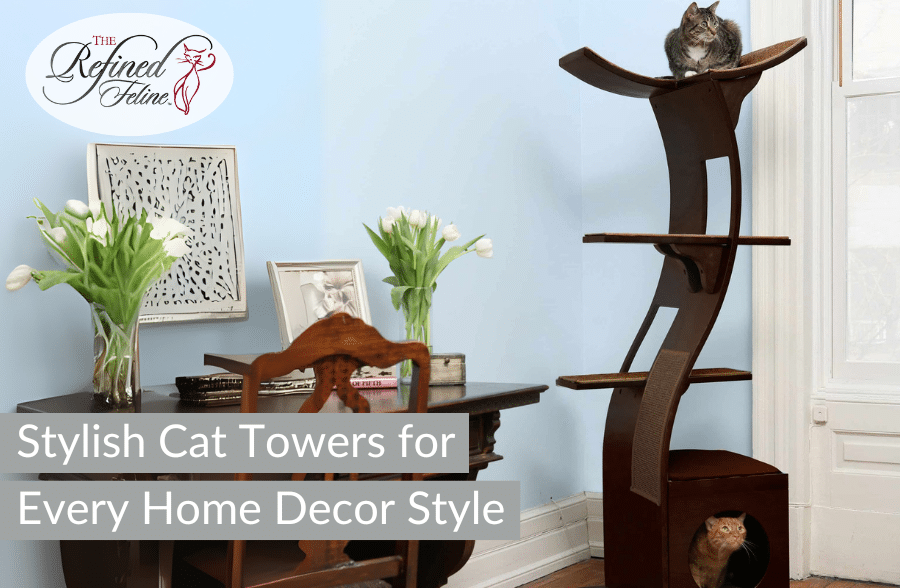
Stylish Cat Towers for Every Home Decor Style
Introduction: Breaking Free from the Cat Furniture Compromise
A familiar scene plays out in homes nationwide: you stand in your thoughtfully designed living room, eyes fixed on that beige carpet-covered monstrosity dominating the corner. The mental gymnastics begin: “Maybe behind the plant… or possibly tucked away in the spare bedroom where guests won’t see…”
For too long, cat owners have accepted an unnecessary aesthetic sacrifice. The traditional cat tower—bulky, carpet-covered, visually disruptive—has been considered an unavoidable eyesore in otherwise carefully curated living spaces.
No more compromises necessary.
Innovative cat furniture designers have completely revolutionized what’s possible, creating stylish cat towers that function as genuine statement pieces while fully satisfying feline needs.
Contemporary designs prove functional cat furniture can enhance rather than diminish living spaces, solving the fundamental tension that has frustrated design-conscious cat owners for decades.
A comprehensive look at how the right stylish cat tower creates harmony in shared human-cat environments, benefiting everyone involved.
The Hidden Costs of Traditional Cat Towers
Traditional cat furniture creates compromises extending far beyond visual disruption:
Visual Discord and Design Disruption
Standard cat towers introduce elements that clash with thoughtful interior design:
– Mass-produced aesthetics disconnected from home decor styles
– Limited color palette (predominantly beige, brown, gray)
– Visually heavy forms dominating space
– Cheap materials communicating disposability
– Carpet coverings accumulating visible hair and dander
– Strictly utilitarian design with zero consideration for context
– Awkward proportions disrupting visual flow
Maintenance Challenges and Durability Concerns
Beyond visual shortcomings, conventional options create ongoing frustrations:
– Deeply embedded pet hair becoming impossible to remove
– Carpet surfaces trapping odors and allergens
– Structural weaknesses developing quickly with active cats
– Non-replaceable components requiring complete replacement when worn
– Materials degrading visibly with normal use
– Cleaning difficulties compromising hygiene
The True Cost Calculation
The apparent “bargain” of traditional cat towers reveals surprising expense:
- Financial Cost: $50-150 initial investment replaced every 2-3 years = $200-600 per decade
- Aesthetic Cost: Daily visual compromise in personal space + explanations/apologies to design-conscious visitors
- Practical Cost: Regular cleaning challenges + accumulating allergens + limited placement options
- Psychological Cost: Constant awareness of compromise + resignation to “necessary ugliness” + design frustration
Such cascading compromises have conditioned cat owners to lower expectations—to believe functional cat furniture and beautiful interiors cannot coexist. An understandable belief, now thoroughly outdated.
The Modern Cat Tower Revolution: Design Meets Feline Science
Where Behavioral Science Meets Design Excellence
Contemporary cat furniture designers have bridged two previously disconnected disciplines:
Feline Behavioral Science establishes cats need: – Elevated vantage points for territorial security – Appropriate scratching surfaces for nail maintenance – Strategic perching spots at various heights – Private retreats for stress management – Enriching climbing opportunities for exercise
Interior Design Principles establish furniture should: – Enhance rather than detract from spatial harmony – Utilize materials appropriate to context – Balance form and function equally – Create visual interest through thoughtful proportions – Express the owner’s personal aesthetic preferences
When merged, the result becomes cat furniture honoring both feline nature and human design sensibility—pieces feeling purposeful rather than apologetic within home environments.
Design Evolution: From Carpeted Tubes to Sculptural Elements
Such transformation didn’t happen overnight. Cat furniture design has progressed through distinct phases:
- Utilitarian Phase (1980s-2000s): Purely functional designs with zero aesthetic consideration
- Camouflage Phase (2000s-2010s): Attempts to disguise cat furniture as something else, often unconvincingly
- Integration Phase (2010s-present): Design-forward approaches acknowledging cat furniture as a legitimate category worthy of design excellence
- Celebration Phase (Current): Cat furniture standing as artwork—pieces visually compelling even without feline functionality
Companies like The Refined Feline have pioneered the final phase, creating pieces celebrating rather than hiding purpose while elevating the design conversation around pet furniture.
Material Science: The Foundation of Stylish Cat Towers
The revolution in cat furniture aesthetics begins with fundamental material choices. The table below illustrates striking contrast:
Material Evolution in Cat Furniture
| Component | Traditional Approach | Contemporary Approach | Benefits of Modern Materials |
| Structure | Cardboard tubes, particleboard | Solid hardwood, bamboo, aircraft-grade aluminum | Greater durability, visual warmth, sustainability |
| Scratching Surfaces | Synthetic carpet | Natural sisal, seagrass, cork | Better claw health, appropriate resistance, reduced shedding |
| Platforms | Carpet-covered composite | Cushioned platforms with washable covers | Improved hygiene, easier maintenance, aesthetic flexibility |
| Coverings | Stapled carpet | Microfiber, organic cotton, premium wool | Superior feel, reduced allergens, design coordination |
| Joints & Hardware | Visible screws, plastic caps | Hidden fasteners, precision joinery | Enhanced stability, refined appearance, improved safety |
Such material revolution addresses both aesthetic and functional concerns simultaneously—creating furniture looking better while performing better in real-world conditions.
Style Mapping: Identifying Your Perfect Cat Tower Aesthetic
Finding the ideal stylish cat tower requires understanding which design language best complements existing decor. The interactive guide below helps navigate diverse options available:
Style Matching Guide: Finding Your Perfect Cat Tower Aesthetic
| Your Home’s Design Style | Recommended Cat Tower Characteristics | Key Elements to Look For | Styles to Avoid |
| Modern Minimalist | Clean lines, neutral palette, hidden functionality | Light woods, geometric forms, unobtrusive hardware, monochromatic scheme | Ornate details, busy patterns, contrasting colors |
| Mid-Century Modern | Organic curves, warm wood tones, architectural influence | Tapered legs, walnut/teak finishes, balanced proportions, subtle curves | Overly decorative elements, ultra-modern materials |
| Industrial/Urban | Raw materials, utilitarian aesthetic, visible structure | Metal accents, distressed woods, exposed joinery, modular components | Delicate details, precious-looking materials |
| Bohemian/Eclectic | Organic forms, textural interest, artisanal quality | Mixed materials, natural fibers, asymmetrical elements, handcrafted appearance | Highly structured forms, cold/clinical materials |
| Contemporary Luxury | Refined finishes, subtle details, premium materials | High-gloss surfaces, metallic accents, precise craftsmanship, sumptuous fabrics | Rustic elements, obviously synthetic materials |
| Scandinavian | Blonde woods, functional simplicity, subtle organic influence | Birch/ash/maple woods, rounded edges, wool accents, integrated functions | Dark/heavy materials, complex forms, high contrast |
| Traditional/Classic | Familiar forms, richer finishes, refined proportions | Cherry/mahogany tones, symmetrical design, subtle decorative elements | Ultra-modern profiles, experimental materials |
Style Integration Tip: When choosing between multiple options, select cat furniture sharing at least two visual characteristics with existing furniture pieces—whether material, color, line quality, or proportional language.
The Lotus Cat Tower: Exemplar of Modern Cat Furniture Design
The Lotus Cat Tower represents an iconic example of modern cat furniture design resolving form/function tension. A signature piece from The Refined Feline exemplifying thoughtful integration of feline needs and design excellence.
Design Specifications
The Lotus Cat Tower presents as a sculptural element with precise technical specifications:
- Construction: Solid wood in either espresso or mahogany finish
- Height: 69” tall (ideal for satisfying climbing instincts)
- Footprint: Space-efficient 20” x 20” base
- Weight: Substantial enough for stability during active play
- Components: Three generously-sized platforms at graduated heights
- Scratching Surface: Integrated sisal material positioned for natural stretching
- Platform Coverings: Replaceable carpet pads with machine-washable covers
Behavioral Engineering
The Lotus Cat Tower’s design directly addresses specific feline needs:
- Vertical Territory: Three distinct height zones for perching and surveillance
- Scratching Optimization: Curved sisal surfaces match natural stretching posture
- Sensory Variability: Multiple textures stimulate tactile exploration
- Strategic Sight Lines: Platforms positioned for optimal room observation
- Security Features: Curved edges create physical and psychological comfort
- Climbing Challenge: Appropriate distance between levels for athletic engagement
- Rest Zones: Generous platforms accommodate various sleeping positions
User Experiences
The Lotus Cat Tower consistently receives positive feedback addressing both aesthetic and functional performance:
“Love looking at what seems like a nice piece of furniture vs. the typical cat towers. Well packaged to protect all pieces, no smell (I’m very sensitive to chemical smells), fairly easy to put together (took me and my husband about 2 hours), wood finish flawless, wood feels strong and well made.” – Julie, Verified Buyer
The 60-day “Happy Cat” guarantee recognizes some cats require adjustment periods with new furniture, allowing customers to ensure feline companions fully embrace investments before committing.
Cat Tower Location
Where a stylish cat tower sits significantly influences both visual integration and feline utilization. Placement strategies maximizing both aesthetic and functional success:
Window-Adjacent Positioning: The Observation Station
Strategic Value: Creates a purposeful activity zone around existing architectural elements while satisfying cats’ desire for outdoor observation.
Implementation Guide:
1. Position 12-18 inches from windows to prevent light blockage
2. Align with window frames for visual coherence
3. Consider sun patterns throughout the day (avoid excessive direct exposure)
4. Create visual counterbalance with plants or furniture on opposite sides
5. Ensure window treatments can still function properly
Design Benefit: Such placement creates intentional “cat watching zones” feeling planned rather than haphazard, while giving cats entertainment through bird and outdoor observation.
Room Divider Implementation
Strategic Value: Utilizes cat furniture as functional architecture to create subtle space definition in open floor plans.
Implementation Guide:
1. Position perpendicular to natural traffic patterns
2. Create appropriate clearance on all sides (minimum 24” for passage)
3. Align with existing architectural features where possible
4. Consider sight lines from primary seating areas
5. Balance with visual weight on opposing side of defined space
Design Benefit: An approach transforming cat furniture from intrusion to functional spatial element serving both species’ needs simultaneously.
Corner use case: The Wasted Space Solution
Strategic Value: Converts often underutilized corner spaces into functional territory appearing purpose-built.
Implementation Guide:
1. Position at 45° angle to maximize visual interest and floor space efficiency
2. Create breathing room between tower and adjoining walls (minimum 6”)
3. Consider diagonal sight lines created through space
4. Balance with appropriately scaled decor on nearby walls
5. Ensure adequate overhead clearance for jumping activities
Design Benefit: Corner placement reclaims often awkward spaces while creating dynamic diagonal lines adding visual interest to otherwise static rectangular rooms.
Social Zone Integration: The Community Builder
Strategic Value: Incorporates cats into family gathering areas without overwhelming human-focused activities.
Implementation Guide:
1. Position cat furniture at the periphery of social zones, not center
2. Maintain 3-5 feet distance from primary seating
3. Create visual relationships with existing furniture through material or color echoes
4. Ensure tower doesn’t block conversation sight lines
5. Consider acceptable jumping radiuses when positioning near tables/shelving
Design Benefit: A placement acknowledging cats as family members included in social spaces while maintaining appropriate boundaries between human and feline activities.
Creating Complete Cat-Friendly Stylish Environments
A stylish cat tower forms the centerpiece of a comprehensive approach to feline-human shared spaces. Complementary elements create fully resolved environments:
Vertical Expansion: Wall-Mounted Cat Components
The Refined Feline offers wall-mounted options extending territory without consuming floor space:
Lotus Branch Cat Shelf
A sculpted wall shelf creating an elegant climbing and perching solution with: – Graceful curved design mimicking natural branches – Solid wood construction with sisal-wrapped sections – Replaceable carpet pad with machine-washable cover – Weight capacity appropriate for most domestic cats – Installation hardware included for secure mounting
Lotus Leaf Cat Shelf
A compact wall shelf providing additional perching options with: – Organic leaf-inspired form factor – Matching wood finishes to coordinate with other Lotus products – Space-efficient design for smaller walls or limited areas – Removable carpet pad for easy cleaning – Simple installation with included hardware
Installation Strategy: Creating vertical pathways using wall components allows cats to navigate rooms at height—providing exercise, territory expansion, and observation points without sacrificing floor space.
Concealed Necessities: Litter Box Solutions
The Refined Cat Litter Box Deluxe addresses the most challenging aspect of cat ownership through thoughtful design:
- Disguises litter areas as attractive furniture pieces
- Multiple finish options to coordinate with existing decor
- Top entry or side entry options to match cat preferences
- Interior shelf for supply storage
- Built-in litter catch system to reduce tracking
- Easy-access maintenance design
Integration Strategy: Positioning concealed litter solutions in transitional spaces (hallways, room peripheries) creates discreet bathroom zones avoiding compromise of high-traffic social areas.
Multifunctional Additions: The Complete Ecosystem
Creating a comprehensive cat-friendly environment might include:
- Minimalist Scratching Solutions: Architectural scratching posts doubling as sculptural elements
- Window Perches: Low-profile designs utilizing existing architectural features
- Hidden Cat Pathways: Shelving systems appearing decorative while creating travel;
- Multi-Use Furniture: Human furniture with integrated cat features (side tables with hideaways, sofas with perching arms)
Coordination Principle: When selecting multiple cat-friendly elements, maintain consistency in at least two visual aspects (material, color, form language) to create cohesive design language throughout the space.
Selecting Your Ideal Stylish Cat Tower
Selection Tool
An evaluation framework helping quantify otherwise subjective considerations:
| Evaluation Criteria | Option 1: _______ | Option 2: _______ | Option 3: _______ |
| Material Quality (1-10) | |||
| Visual Harmony with Space (1-10) | |||
| Height Appropriateness (1-10) | |||
| Platform Size Adequacy (1-10) | |||
| Scratching Surface Quality (1-10) | |||
| Ease of Maintenance (1-10) | |||
| Assembly Complexity (1-10) | |||
| Value for Investment (1-10) | |||
| Warranty Coverage (1-10) | |||
| Cat Appeal Probability (1-10) | |||
| TOTAL SCORE (out of 100) |
Decision Protocol: When evaluating options using the matrix, prioritize the top three criteria most important to your situation (e.g., visual harmony, cat appeal, maintenance). Create a weighted average emphasizing key factors when scores come close.
How to Get your cat used to cat tower
Even the most beautiful cat tower fails if feline companions refuse to use it. A systematic approach maximizes adoption likelihood:
Pre-Introduction Preparation
1. Strategic Placement: Position tower where your cat already spends time
2. Familiar Element Transfer: Place bedding or toys with established scent on tower
3. Competitive Product Removal: Temporarily remove or restrict access to competing perches/beds
4. Assembly Acclimation: Allow tower to “air out” for 24 hours after assembly
5. Attractant Application: Apply catnip or catnip spray to scratching surfaces
Graduated Introduction Protocol
Phase 1: Discovery (Days 1-3) – Allow natural investigation without pressure or forced interaction – Reward proximity and exploratory behavior with treats – Use interactive toys near (but not on) tower – Maintain positive, non-demanding energy around furniture
Phase 2: Engagement (Days 4-7) – Place familiar treats on accessible platforms – Create play sessions moving progressively closer to tower – Use wand toys to guide movement onto lower platforms – Reward any interaction with tower with praise/treats
Phase 3: Integration (Days 8-14) – Begin regular play sessions incorporating the tower – Feed treats exclusively on tower platforms – Place mobile toys on platforms for self-directed play – Reinforce use through consistent positive feedback
Phase 4: Habituation (Days 15-30) – Monitor preferred platforms and positions – Adjust surrounding elements to enhance preferred usage patterns – Gradually normalize tower as standard territory – Document successful interaction patterns for future reference
Long-Term Success Metric: The Refined Feline’s 60-day “Happy Cat” guarantee recognizes cats require varying adjustment periods. Success should be measured through consistent, self-initiated use rather than occasional interaction.
Maintenance Protocol: Preserving Your Investment
Quality cat furniture represents a significant investment in both aesthetics and functionality. A maintenance schedule maximizing longevity:
Weekly Care Routine
· Vacuum platforms and sisal surfaces to remove hair and dander
· Wipe down wood surfaces with appropriate cleaners (follow manufacturer guidelines)
· Check and tighten any hardware showing signs of loosening
· Remove accumulated hair from carpet inserts using rubber brushes
· Inspect for any new scratches or damage requiring attention
Monthly Maintenance
· Remove and launder machine-washable covers
· Deep clean sisal scratching surfaces with brush attachments
· Apply wood conditioner if recommended for your specific finish
· Check structural stability at all connection points
· Rotate any removable cushions to ensure even wear
· Photograph condition to track wear patterns over time
Quarterly Assessment
· Evaluate wear patterns on scratching surfaces
· Check all joints and connection points for stability
· Deep clean underneath and behind tower
· Assess need for replacement parts
· Consider repositioning to distribute sun exposure or wear
Annual Refresh
· Schedule complete disassembly and cleaning if recommended
· Replace heavily worn components rather than entire structure
· Apply recommended protectants to wood surfaces
· Update any accessories (toys, cushions) showing significant wear
· Re-evaluate placement based on current household patterns
Maintenance Philosophy: Preventative care represents a fraction of replacement cost. Establishing regular maintenance routines extends functional lifespan significantly while preserving aesthetic appeal.
Comparative Product Analysis: Leading Stylish Cat Tower Options
A detailed comparison highlighting key differences between popular models:
| Feature | Lotus Cat Tower | Metropolitan Cat Condo | Competitors’ Standard Options |
| Height | 69” | 62” | Typically 48-60” |
| Base Footprint | 20” x 20” | 15” x31” | Often 24-36” |
| Weight | 70 lbs | 65 lbs | Typically 30-45 lbs |
| Primary Material | Solid wood | Solid wood | Usually particleboard with veneer |
| Platform Count | 3 main platforms | 2 condos + 3 platforms | Typically 3-5 platforms |
| Scratching Material | Natural sisal | Natural sisal | Often synthetic carpet or rope |
| Cushion Covers | Machine washable | Machine washable | Often non-removable |
| Assembly Time | ~1 hour | ~1 hour | Typically 30-90 minutes |
| Warranty | 1 year | 1 year | Often 30-90 days |
| Return Policy | 60-day “Happy Cat” guarantee | 60-day “Happy Cat” guarantee | Typically 14-30 days, often with restocking fees |
Such comparison reveals important distinctions in material quality, construction standards, and warranty coverage directly impacting both aesthetic value and functional longevity.
FAQ
How do I know if my cat will use a designer cat tower?
Cats naturally gravitate toward elevated positions and appropriate scratching surfaces, but individual preferences vary. Look for designs incorporating multiple features (different heights, varied textures, hiding spots) to increase appeal. The 60-day “Happy Cat” guarantee from companies like The Refined Feline provides peace of mind during adjustment periods.
Are modern cat towers worth the higher price compared to traditional options?
When analyzing cost-per-year of use, many stylish towers actually represent superior value due to extended durability and replaceable components. When factoring daily aesthetic benefit, furniture protection, and potential improved cat behavior, the value proposition becomes even stronger.
What’s the best way to help my cat transition to a new tower design?
Position the new tower near favored lounging areas, apply familiar scents or catnip, and create positive associations through treats and play. Some cats adapt immediately while others need several weeks. Patience and positive reinforcement yield best results.
How difficult is assembly for modern cat towers?
Contemporary designs typically feature improved assembly systems with better instructions and hardware than traditional models. Most can be assembled in 1-2 hours with basic household tools, though more complex designs may require additional time or a second person to assist.
How do I clean and maintain natural materials like wood and sisal?
Wood surfaces can be cleaned with appropriate wood-safe products specific to the finish. Sisal can be vacuumed regularly and occasionally spot-cleaned with diluted vinegar solutions. Always follow manufacturer guidelines for specific care instructions.
Conclusion: The Integration of Form and Function
Cat furniture has evolved from purely utilitarian eyesores to design-forward statement pieces, representing a fundamental shift in conceptualizing shared human-animal spaces. Pet owners no longer must choose between aesthetics and functionality—contemporary cat furniture seamlessly integrates both priorities.
A stylish cat tower stands as tangible proof compromise isn’t necessary—cats deserve beautiful objects honoring natural behaviors, and humans deserve homes reflecting design sensibilities. Dual-purpose pieces create unprecedented harmony in shared environments.
Whether attracted to architectural elegance of the Lotus Cat Tower or considering other contemporary designs, investing in quality cat furniture acknowledges both species’ needs with equal importance. A truly integrated living space results where design and function coexist without compromise.
Home environments tell stories about values and priorities. Modern cat furniture ensures stories include honoring all inhabitants—feline and human alike—through thoughtful design enhancing life for everyone sharing space.
{ “@context”: “https://schema.org”, “@type”: “FAQPage”, “mainEntity”: [ { “@type”: “Question”, “name”: “How do I know if my cat will use a designer cat tower?”, “acceptedAnswer”: { “@type”: “Answer”, “text”: “Cats naturally gravitate toward elevated positions and appropriate scratching surfaces, but individual preferences vary. Look for designs incorporating multiple features (different heights, varied textures, hiding spots) to increase appeal. The 60-day “Happy Cat” guarantee from companies like The Refined Feline provides peace of mind during adjustment periods.” } }, { “@type”: “Question”, “name”: “Are modern cat towers worth the higher price compared to traditional options?”, “acceptedAnswer”: { “@type”: “Answer”, “text”: “When analyzing cost-per-year of use, many stylish towers actually represent superior value due to extended durability and replaceable components. When factoring daily aesthetic benefit, furniture protection, and potential improved cat behavior, the value proposition becomes even stronger.” } }, { “@type”: “Question”, “name”: “What’s the best way to help my cat transition to a new tower design?”, “acceptedAnswer”: { “@type”: “Answer”, “text”: “Position the new tower near favored lounging areas, apply familiar scents or catnip, and create positive associations through treats and play. Some cats adapt immediately while others need several weeks. Patience and positive reinforcement yield best results.” } }, { “@type”: “Question”, “name”: “How difficult is assembly for modern cat towers?”, “acceptedAnswer”: { “@type”: “Answer”, “text”: “Contemporary designs typically feature improved assembly systems with better instructions and hardware than traditional models. Most can be assembled in 1-2 hours with basic household tools, though more complex designs may require additional time or a second person to assist.” } }, { “@type”: “Question”, “name”: “How do I clean and maintain natural materials like wood and sisal?”, “acceptedAnswer”: { “@type”: “Answer”, “text”: “Wood surfaces can be cleaned with appropriate wood-safe products specific to the finish. Sisal can be vacuumed regularly and occasionally spot-cleaned with diluted vinegar solutions. Always follow manufacturer guidelines for specific care instructions.” } } ] }

